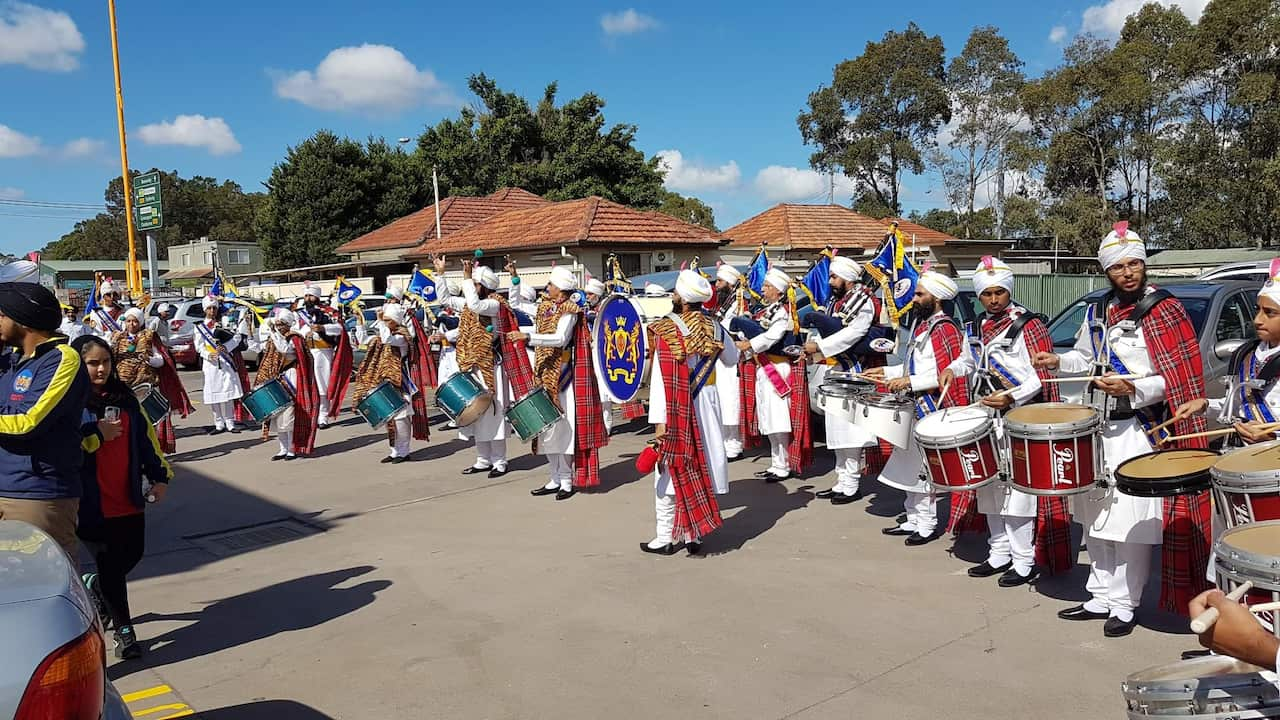'Sri Dasmesh Pipe Band live on the legacy of Sikh Gurus and Sikh Raj', says S Harvinder Singh of the Band.
The Sri Dasmesh Band visited Australia to take part in Sydney's ANZAC day parade.
Apart from that, they performed in various programs almost on a daily basis, across Sydney, Melbourne and Canberra. The highlight of the tour will be the leading of the Sikh Regiment at the ANZAC Day Parade on the 25th April 2018, to mark the centenary celebrations of World War-I. It is noteworthy that this band has visited twice before to take part in ANZAC day parades in the year 2009 and 2015 and were highly appreciated by the larger community due to their unique and impressive look and outfit they proudly wear.
In 2015, Sri Dasmesh Pipe Band made history by being the first Sikh band and the first South East Asian Band to compete in World Pipe Band Championship held in Glasgow. This World Pipe Band Competition has been held yearly for last 75 years. It was a matter of pride that this band competed against 8000 other banders from 250 teams representing 16 nations. Overall their performance was judged at ranking 15.
Sri Dasmesh Sikh Pipe Band hope to continue to honour the tradition of the Sikhs and bring about media attention to the mega heroic contributions of this small community over 500 years of upholding the Freedom of Rights for all Humanity. Some historians says that Guru HarGobind Ji had the Nagara (wardrums) built at Lohgarh (Fort of Steel). The drums used to be played twice a day to signify the sovereignty of the Sikhs. Similarly, these drums were used on horseback to lead the first Sikh Armies that were assembled to defend the freedom of religious practice and human rights.
Some historians says that Guru HarGobind Ji had the Nagara (wardrums) built at Lohgarh (Fort of Steel). The drums used to be played twice a day to signify the sovereignty of the Sikhs. Similarly, these drums were used on horseback to lead the first Sikh Armies that were assembled to defend the freedom of religious practice and human rights.

was liked so much that RSL requested them to march three times in the ANZAC parade. Source: SBS Punjabi
In 1684, Guru Gobind Singh had a special drum prepared. He named it as the Ranjit Nagara (the winner of the battle-field). This drum was beaten at the Keshgarh Sahib throne, at Anandpur Sahib, every day, as a declaration of the sovereignty of the Sikhs, during the difficult time when religious freedom and human rights very being suppressed and violated by the Mughal Rulers. Guru Sahib made it obligatory that before the closing of the Gurudwara, the beating of the Nagara was mandatory, a practice followed to date. The Nagara became a symbol of the sovereignty of truth and righteousness.
The Nagaras are huge drums, about 2 to 3 feet in diameter, and played with sticks. The special Ranjit Nagara can be up to 5 feet across. Traditionally, Nagaras were war-drums mounted on horses and brought into battle by the marching armies. The thundering beat of these huge drums usually meant that the army was marching into battle.
Maharaja Ranjit Singh had then implemented in the marching military bands of his armies. The picture above is from the Lahore Museum that shows some of the drums that were used by the marching bands of the Maharaja’s army.
After the annexure of Punjab by the British, the Sikhs who were very well revered as a martial race were enlisted into the British Army to defend the British territories. The Sikh Pipe Bands were established together with the Sikh Pipe Bands lead the many Sikh Regiments and Punjabi Regiments during the 1st and 2nd World Wars in Asia, Africa and Europe. These band members suffered the highest casualties as they lead the march to war and had no protection from the bullets of their enemies. They struck fear in their enemy while inspiring their battalions to charge the enemy. We Sikhs represent the Freedom of Rights for all Humanity and choose to live with Integrity, Honour and Pride. We wear our Turbans as our battle gear to live these values daily.










